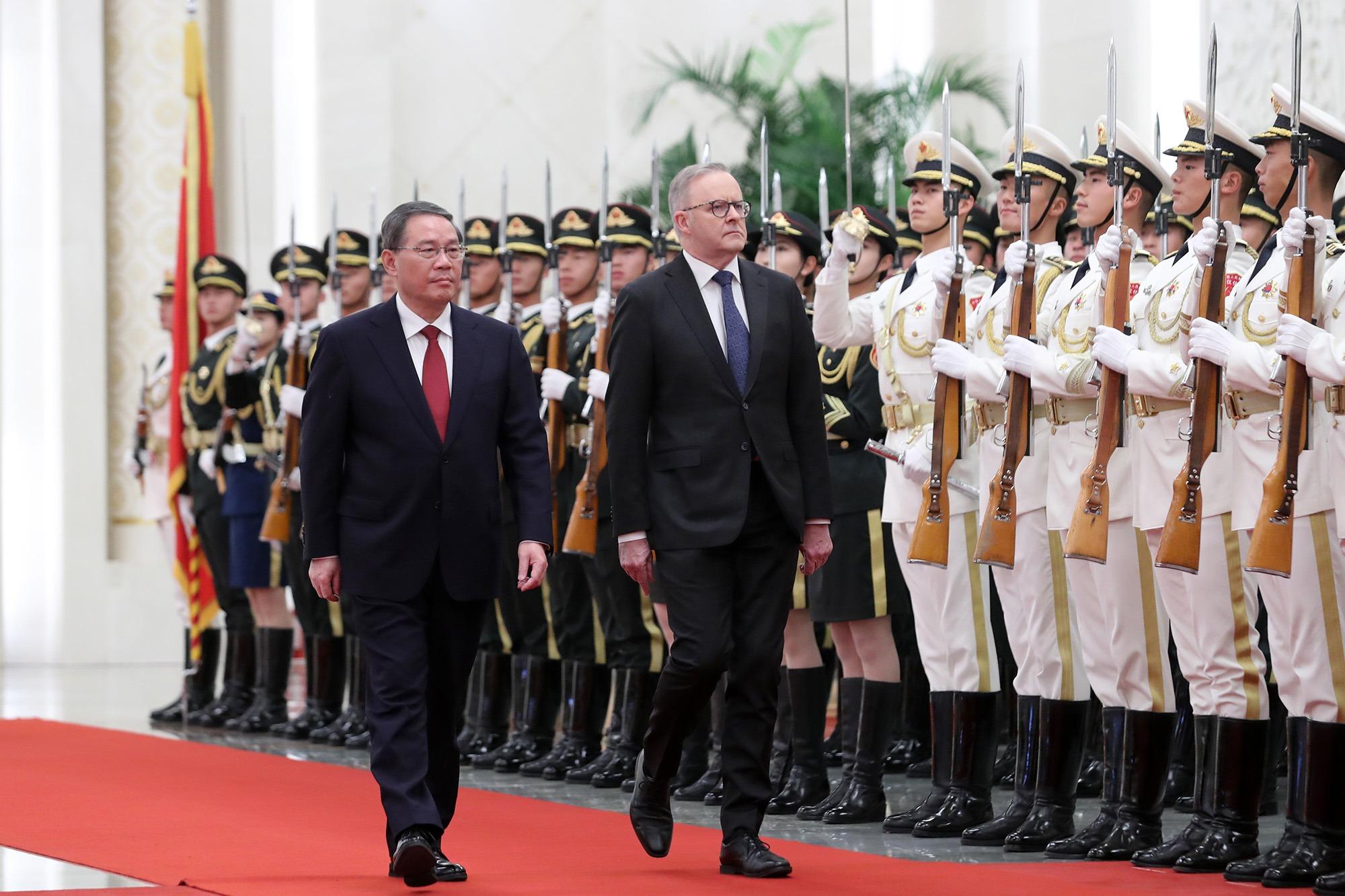China-Australia relations seen boosted by trip amid vows to bolster dialogue
 Premier Li Qiang holds a welcoming ceremony for visiting Australian Prime Minister Anthony Albanese at the Great Hall of the People ahead of their talks in Beijing on Nov 7, 2023. (WANG ZHUANGFEI / CHINA DAILY)
Premier Li Qiang holds a welcoming ceremony for visiting Australian Prime Minister Anthony Albanese at the Great Hall of the People ahead of their talks in Beijing on Nov 7, 2023. (WANG ZHUANGFEI / CHINA DAILY)
Australian Prime Minister Anthony Albanese’s visit to China has helped restore normal bilateral relations that began 50 years ago, after several years of protracted disputes in the past decade, experts say.
They said the fact his visit took place 50 years after then-Australian prime minister Gough Whitlam’s historic trip to China in 1973 should not be understated. The visit of Whitlam, who like Albanese was the Australian Labor Party leader, paved the way for Australia’s formal diplomatic recognition of China.
Albanese and Chinese President Xi Jinping both acknowledged Whitlam’s role in laying the foundations for the relationship.
In formally welcoming Albanese to China on Nov 6, Xi said Whitlam had dug the well of the Australia-China relationship.
“In China, we often say when drinking water, we should not forget those who dug the well,” he said. “The Chinese people will not forget prime minister Whitlam for digging the well for us.”
The two countries must now embrace the next 50 years, Xi said, adding that a “healthy and stable China-Australia relationship serves the common interests of our two countries and two peoples”.
Beijing and Canberra agreed to keep building up engagement in political dialogue, trade, response to climate change, and people-to-people exchanges as both sides pledged to continue stabilizing and developing bilateral ties, according to a joint statement released on Nov 7.
The statement followed a meeting in Beijing between Chinese Premier Li Qiang and Albanese, who wrapped a four-day official visit that day.
The two sides “agreed that both nations could grow the bilateral relationship and uphold their respective national interests if they navigated their differences wisely”, said the statement.
The two nations also pledged to resume government-to-government mechanisms, including the annual leaders’ meeting between the Chinese premier and the Australian prime minister.
To further facilitate trade and economic links, both sides vowed to work toward memorandums of understanding on issues including intellectual property and food safety, while highlighting the need to collaborate on climate and energy.
During his talks with Albanese, Li stressed Beijing’s readiness to work with Canberra in the spirit of mutual respect and understanding to further strengthen dialogue and communication, deepen political mutual trust and properly handle differences.
China is willing to work with Australia to strengthen cooperation in traditional areas such as energy and resources, and build up cooperation over green development, the digital economy, technological innovation, and the healthcare sector, he said.
At a news conference following the meeting, Albanese described the visit as “very successful” and the dialogue with Li as “very constructive”.
Zhu Feng, dean of the School of International Studies at Nanjing University, said the visit by Albanese signaled that the two nations have turned the page on a chapter of turbulent political and trade ties.
“The constructive and strategic policy choice by the Australian government will undoubtedly serve the interests of both nations and regional peace and cooperation,” he said.
Colin Mackerras, an Australian Sinologist and professor emeritus at Griffith University in Queensland, hopes Albanese’s visit will restore the balance between the two countries.
“For me, the people-to-people relationships are just as important, and I think that they may get sold more easily too, because recently there’s been some good developments, like for example, in tourism and in educational relations,” he said.
Before Labor returned to power under Albanese last year, for the best part of seven years under the LiberalNational Coalition government, political and trade relations between Australia and China had been in decline.
“Over that time, the bilateral and global context has changed significantly,” said David Olsson, national president of the Australia China Business Council.
“The one thing that hasn’t changed is that bilateral trade, based on the complementarity of our economies and supported by personal connections, has been the anchor and provided the stability needed to navigate uncertain currents and obstacles,” Olsson said.
James Laurenceson, director of the Australia-China Relations Institute at the University of Technology Sydney, said the statements released by both heads of state indicate that relations are now back on track.
“Both sides are saying much the same thing, and that is to focus on areas of common interest.
Contact the writers at karlwilson@chinadailyapac.com


